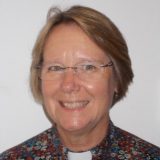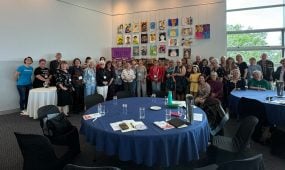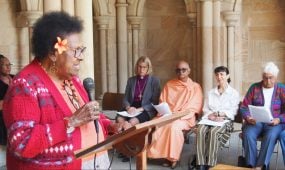Clergy Summer School 2019
Reflections
Clergy Summer School participants from across the Diocese share their highlights and key learnings of the recent Summer School, which is held annually at The Southport School
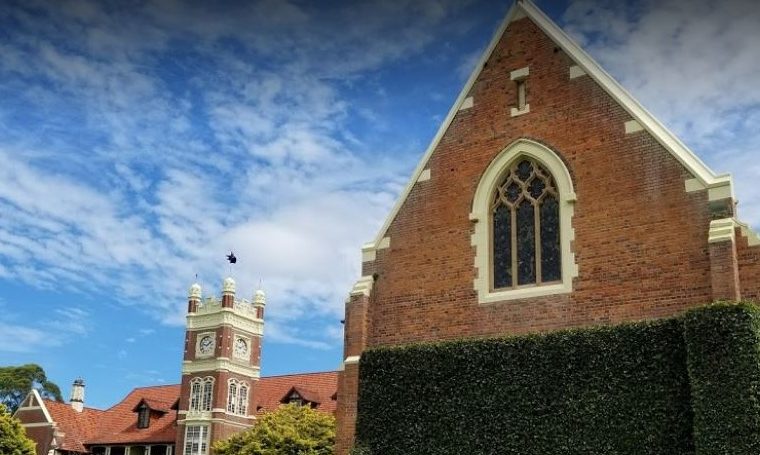
Four Clergy Summer School participants from across the Diocese share their key learnings from the recent Summer School and how they will implement these learnings in their ministry this year. The two-day Clergy Summer School has been held annually at The Southport School for several decades and is a highlight of the clergy calendar because of the wonderful venue, esteemed speakers, moving worship times and the collegiality experienced by those who attend.
The Rev’d Sue Wilson, Rector of Maryborough Anglican Parish and Vice Chair of the Clergy Summer School Committee
New ideas and perspectives can be both frightening and challenging, and once again Clergy Summer School presented those attending with much food for thought! The three-day conference began with Fr Brendan Byrne SJ presenting a general introduction to the gospel of Luke – a very timely topic, as we are currently in Year C in the Lectionary readings. The key themes that came through Fr Brendan’s talks were acceptance and hospitality, tying in with the Archbishop’s ‘Year of Generous Hospitality’. This has inspired our parish, with congregation members and me initiating hospitality by inviting a small group of people to our homes to socialise, for example by playing a game called Finska. Those people then extend the hospitality to others in their homes. The idea is to get to know others, have conversations and grow the number of people we have contact with.
Fr Brendan also offered new insights into many aspects of the Lukan narrative, providing fresh thoughts on ways to interpret the Gospel message in parish and other settings. It is never too late to learn something new about the Gospel stories. Something that has stuck in my mind concerned the story of Zacchaeus, who said ‘Behold, Lord, the half of my goods I give to the poor, and if I have defrauded anyone of anything, I restore it fourfold (Luke 19.8).’ In the Greek original, the sentence is written in the present tense, not the future tense. He is describing what he is already doing, not what he will do. It makes a difference to how you talk about the story. Often, when you can share how others have thought differently about stories in the Bible, it gives people permission to examine what they have been taught and their opinions and gives them the opportunity to change.
Advertisement
Craig Keen read to us from his forthcoming book Sanctity: Standing Up to the Coming of God, which, for most of us, was a mind stretching exercise. He began, as one would expect, with chapter one, ‘Holy, Holy, Holy, The World Need Not to Have Been’, an account of the doctrine of creatio ex nihilo (‘creation from nothing’). Craig has been described as a theopoetic. I suggest buying the book, as his words need to be read and deeply pondered upon.
Clergy Summer School is very much about professional development and, as such, has over the years had a variety of different speakers on many and varied topics. But Clergy Summer School is also about collegiality. It is an opportunity to get together with fellow clergy in an informal setting to talk, share ideas and offer mutual support. It is a safe place, organised by clergy for clergy, from which you can return to your home or place of work, be it a parish, hospital, school or another setting, refreshed and reinvigorated to start the new year. This was my ninth year of attendance and I am looking forward to many more. It really is a wonderful way to start the year.
Advertisement
The Rev’d Robert Paget, Air Force Chaplain
The main speakers at this year’s Clergy Summer School approached their topics in completely different ways. Fr Brendan Byrne SJ presented an academic approach to Luke’s Gospel, highlighting hospitality which feeds into the Archbishop’s theme for this year, ‘Generous Hospitality’. There was plenty of material from Luke sermons that is fit for the year that lies ahead of us. Theologian Craig Keen, on the other hand took a poetic approach. This approach was a little ‘left field’ but having picked up from his bio that he was a jazz musician, it all made perfect sense. While there was no space to link his approach into other theological approaches, I found that I did connect emotionally with his recitation. His ‘performance’ played out like a piece of music. Not the stuff that plays well into sermon preparation, but it provided meat for reflection and meditation.
These two approaches complemented each other very well. It’s a great temptation to connect with the Gospel on a purely academic basis, but I found it refreshing to make that connection emotionally, to allow it to connect with the heart to resonate deep within. It’s there, touching the heart, that the Gospel makes the difference, inspiring us to be those who seek the connection with the divine, to allow God a space within to speak gently to us. While Brendan’s talks will help with the weekly preparation of sermons, I suspect that Craig had laid a foundation that will help bring a divine connection into the daily round.
The topic of hospitality has been a recurring theme over the years. With the Archbishop giving it special focus this year, its prominence at the Summer School was a significant prompt. This year, I will be looking for new ways to express hospitality in the way that I meet with people, those who come to church on Sundays and those with whom I ride. There’s always opportunity to show how welcoming and generous is the love of God.
The Rev’d Helen Paget, Priest-in-Charge, Parish of Boonah-Harrisville
Fr Brendan Byrne SJ provided some challenging reflections on both Luke’s Gospel and Acts, exploring the areas of infancy stories in Luke; how the Christian movement related to the surrounding world; how Jesus ‘emerged’ onto the scene; the rejection of him as prophet; hospitality, as it is shown in Luke; the way Luke deals with ‘conversion’; how people are ‘labelled’ in Scripture; parables around the problem of wealth; parables showing God’s mercy; and, how Luke presents Eucharist. Brendan engaged all in the room with different angles, and new directions for taking future sermons. I found his insight and easy lecture/discussion style pleasant and he made it a pleasure to listen. One of the many things which I was able to take away from the sessions was the complexity of Luke and the multiplicity of angles that can be seen in his writings and I will now, hopefully, be able to draw out a lot more from the passages we see on Sundays in my sermons during this ‘Year of Luke’.
The lecture style of theologian Craig Keen was very different. Preferring to simply ‘read’ from one of his books (yet to be published), he provided challenging thoughts leading to, at times, emotion charged discussions about creation, ex nihilo (‘out of nothing’), and God. I shall now be looking to read some of Craig’s recent books, as well as looking for the release of his new books.
The Social Justice Session this year was presented by Samone Ellem, a Case Manager from MDA (Multicultural Development Association), who spoke to us about the work they do in the various settings throughout Queensland in assisting in the settlement of refugees into the communities they are living in. I found this most informative, and she was able to explain the difference between the help her organisation is able to give to those with recognised refugee status and those still seeking asylum currently living in ‘limbo’ awaiting determination of refugee status and for many of whom there is little or no government support, little if any income and no access to services. I found the material she delivered very informative and am now able to discuss these different areas with those in the community of my parish who have many questions about the conflicting reports and stories they have heard through the media.
But, what I found the best reason for coming to Summer School is the collegiality, the opportunity to meet together in a neutral, unpressured, casual setting where everything is optional, everything is ‘my’ choice and I can just ‘be’ without any pressure or expectation. The worship was enlivening, the reflections offered by The Rev’d Canon Bruce Boase inspired, the music was refreshingly peaceful, and while the food may have reflected the fact that we were at a large boarding school, it was still nutritious, tasty and fulfilling.
The Rev’d Geoff Hoyte, Area Dean of Logan Deanery
For me, both Clergy Summer School key speakers were useful for refreshing my thinking.
Prof Craig Keen’s input was a highlight of the year. He is a retired theology professor and his input was a distillation of his life’s thought. He talked with us about what it means to speak of God without comparing God to other things and the importance of ‘not lying’ when we talk about God. He also reflected on the nature of Christian life as a ‘gift’ that leads to a call to discipleship. His lectures were for me a kind of brain-gym, an example of clear and honest thinking, which has to underpin clear communication.
Fr Brendan Byrne SJ is one of the world’s leading New Testament scholars. It was a privilege to meet him and listen to him at last. His input on Luke’s Gospel was in some ways familiar, as I have been reading and preaching this Gospel for a while now. But, he has his own version of why the Gospel of Luke was written – to answer the question of how believers should relate to the community in which they live. A key theme raised is that Jesus was rejected, so don’t panic if we are too – just do what He did. Jesus practised hospitality, didn’t label people, expected deep conversion and looked for a time when the God will ‘cast down the mighty from their thrones and raise up the lowly’.
So, for me Clergy Summer School this year was like sharpening the blade. It gave me tools to rethink what we are doing as Church and new ways and things to preach about. I’ll be back next year.
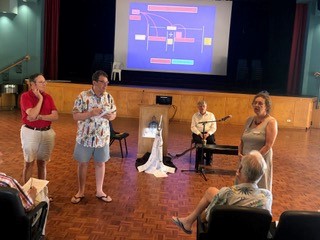
The Rev’d Dr Cathy Laufer launching her latest book at the Clergy Summer School
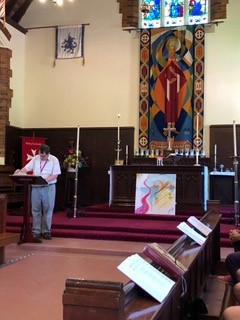
The Rev’d Canon Gary Harch reading in the lovely Southport School chapel at the Clergy Summer School

